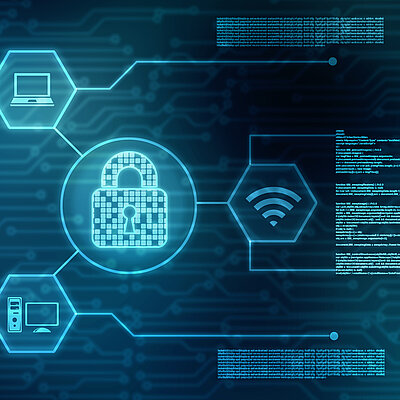
Cyber-Resilient Architectures and Security (CRAS)
How secure is our networked world?
We are currently experiencing the digital transformation of our economy and society. This fundamental change is accompanied by extensive digitization and networking in all areas, creating a world in which the previous separation between off - and online no longer predominates. The physical world is merging with the digital world.
This presents many new opportunities and possibilities, but also an equal number of challenges and risks.
ICT security in particular can no longer rely solely on established models and solution strategies. The trinity of privacy, integrity, and availability as the fundamental base of IT-Security must be reconsidered and revised to fit the new global cyberworld. In the networked world, previously self-suffi cient systems have suddenly become elements of a global "system of systems". The fusion of heterogeneous application systems increases the number of targets for cyberattacks and their harmful effects. Security gaps in soft- and hardware represent one of the biggest challenges, since they are deeply rooted in these systems’ own development histories. Over and above this, the deep integration of, and high level of interdependency between, ICT and physical systems present new areas for attack, for which innovative defense concepts are hard to find.
The discovery of the ›Meltdown‹ hardware gap, that can be exploited using the ›Spectre‹ attack scenario, illustrated that full protection against cyber-attacks can never be guaranteed. Such gaps in security as these serious processor errors often remain undiscovered for years, during which time they can be exploited by attackers. A further problematic issue is soft- and hardware components that use outdated security solutions that, in addition to this, were often never intended to be used within a system of systems. These solutions often lack basic options for retrospective back-ups, such as patch management. Security experts have thus been giving warnings about inadequate quality control in the Internet of Things for many years now. The fight for market share often comes at the cost of product security, in turn often first made possible by the lack of quality control standards.
The Cyber-Resilient Architectures and Security competence cluster is addressing these challenges, answering them with a four-point model that makes systems robust, stable, and adjustable when faced with flexible, cooperative, intelligently acting attackers:
- A state-of-the-art security architecture for end-point and communications security provides the basis.
- A resilience architecture mitigates the eff ects and scope of impact of attacks.
- Metrics, methods, processes, and standards to measurably and verifiably secure the elements of these architectures and their interaction in development, evolution, and implementation.
- Usability and controllability of key user interfaces despite increasing system complexity.
Employees of the Competence Cluster
Michael Brand: Trust models and anomaly detection
Björn Siemers: Incidence response and attack technologies
Persons 
B
D
F
L
E-Mail: sebastian.lehnhoff(at)offis.de, Phone: +49 441 9722-240, Room: O50
M
E-Mail: jorge.marx-gomez(at)offis.de, Phone: +49 441 798 - 4470, Room: A4-3-315
N
U
V
Projects 
2025
2019
Polymorphic agents as cross-sectional software technology for the analysis of the operational safety of cyber-physical systems
Duration: 2019 - 20222018
Software Methods and Technologies for Modular Updates of Cyber-Physical Systems
Duration: 2018 - 2021 Publications 
2026
Brand, Michael and Stark, Sanja and Holly, Stefanie and Kamsamrong, Jirapa and Mayer, Christoph and Lehnhoff, Sebastian; Towards Energy System Resilience; 2026
van Doren, Davy and Droste-Franke, Bert and Brand, Michael and Derendorf, Karen and Fohr, Gabriele and Gils, Hans Christian and Kaiser, Matthias and Knieling, Jörg and Lehnhoff, Sebastian and von Maydell, Karsten and others; Towards Energy System Resilience; 2026
2025
Fernando Peñaherrera V.; Jan Philipp Hörding; Sarah Fayed; Henrik Wagner; Astrid Nieße; 23rd Wind & Solar Integration Workshop (WIW 2024); März / 2025
2024
Azamat, M., Werth, O. & Uslar, M.; Americas Conference on Information Systems (AMCIS 2024); June / 2024
Azamat, M. et al.; Secure Cyber Cluster Whitepaper; July / 2024
2023
Fraune, Bastian and Woltjen, Torben and Siemers, Björn and Sethmann, Richard; 2023 IEEE Belgrade PowerTech; 2023
Narayan, Anand and Brand, Michael and Lehnhoff, Sebastian; Energy Informatics; October / 2023
2022
Haack, J and Narayan, A and Patil, AD and Klaes, M and Braun, M and Lehnhoff, S and de Meer, H and Rehtanz, C; Electric Power Systems Research; July / 2022
Björn Siemers, Lars Fischer, Sebastian Lehnhoff; 2022 IEEE 7th International Energy Conference (ENERGYCON); 06 / 2022
2021
Michael Brand, Felipe Castro, Batoul Hage Hassan, Carsten Krüger, Torben Logemann, Björn Siemers, Dennis Weller, Torge Wolff, Sebastian Lehnhoff; Abstracts of the 10th DACH+ Conference on Energy Informatics; 09 / 2021

